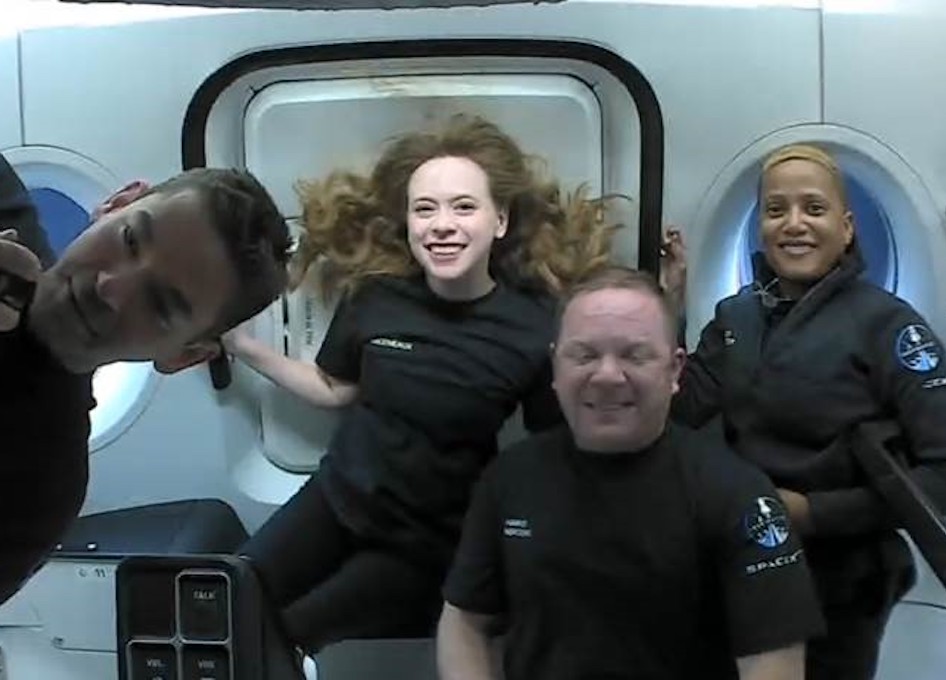Translational Research Institute for Space Health Turns Inspiration4 Commercial Crew into Health Researchers

On Wednesday, Inspiration4 became the first all-civilian space flight to orbit Earth. During their three days in space, crew members Jared Issacman, Sian Procter, Hayley Arceneaux, and Chris Sembroski will see some incredible views from the Dragon capsule’s cupola.
Also filling their schedule: health research on behalf of the Translational Research Institute for Space Health (TRISH) at Baylor College of Medicine in Houston, Texas. TRISH is sponsoring a handful of carefully selected projects that the crew will perform before, during and after the flight. The data collected by I4 crew has potential to increase the understanding of how space impacts the human body- especially the bodies of not in the peak condition typical of NASA’s astronauts.
TRISH is the innovation partner to the NASA Human Research Program. The Institute looks for ways to augment the work that NASA is doing to not only mitigate risks to health and performance of astronauts but make an impact in science, medicine, and technology advances for Earth. NASA gave its endorsement to private astronaut missions back in 2019. TRISH is the first group to leverage commercial flights for human health research on behalf of NASA. Working with TRISH could help commercial crews meet the FAA’s criteria for earning official astronaut wings if they are considered as crew by the launch provider.
“Space is hostile to both physical and mental health of explorers,” said Dorit Donoviel, Ph.D., Executive Director of TRISH. “Yet as commercial spaceflight makes space travel is more accessible, and even routine, we have to prepare for more diverse space travelers that will be making the journey. Research carried out by the Inspiration4 crew gives us the opportunity to increase the space health knowledgebase to develop the health protections needed.”
The Inspiration4 crew will conduct the following TRISH-sponsored research, most of which is very similar to NASA’s standard measures for astronauts. Using an Apple Watch, the crew will collect research-grade ECG activity, movement, sleep, heart rate and rhythm, blood oxygen saturation, and ambient light intensity which affects circadian rhythms.
The I4 crew will perform a series of tests in the Cognition app designed to assess changes in behavioral and cognitive performance. This is the same app that is currently used by astronauts in NASA-funded research studies.
Hayley, Sian, Jared, and Chris will scan their own bodies via a Butterfly IQ+ Ultrasound device, which is designed with artificial intelligence guidance for non-medical experts. Data collected will determine if non-medical experts can self-acquire clinical grade images without guidance from ground support and will provide a timeline of biological changes before and during spaceflight. This device is also currently being tested by astronauts on the International Space Station. Most important is the scan of the blood flow through the veins in the neck because NASA recently reported a thrombotic event in an astronaut.
The crew will collect and test during flight drops of blood during spaceflight for markers of immune function and inflammation using a state-of-the-art miniaturized device called the Vertical Flow Immunoassay (VFI). Most blood analyses currently performed on astronauts is performed on blood sent back to Earth.
Use balance and perception tests pre-flight and immediately post-flight to measure sensorimotor adaptation during the changes of gravity. These tests are currently performed by astronauts upon return from spaceflight. The research team is hoping to be able to identify those people who will need special interventions in order to quickly adapt to spaceflight.
Samples are being collected investigators at Weill Cornell Medicine, and when these arrive at Baylor College of Medicine, the biological fluids will be fully analyzed using state of the art “omics” analyses and matched to the physiological data collected from the studies mentioned above. All this data will be made available to the research community to study.
Using data and samples from Inspiration4 and future commercial flights, TRISH is creating a state-of-the-art integrated medical and environmental research knowledge bank and repository for biological samples. A centralized and standardized research database will be available to NASA and the global research community.
The effort is part of TRISH’s EXPAND (Enhancing eXploration and ANalog Definition) program, which promises to study human health and performance in civilian passengers traveling to space. The institute is currently building research partnerships with other commercial space missions and flight providers. Future research endeavors will including early detection and treatment of medical conditions, protection from radiation effects, mental health, team dynamics and more.
“TRISH exists to find and deliver breakthrough research and technologies back to NASA, and this is exactly what we are doing through the EXPAND program by collaborating with commercial spaceflight providers,” Urquieta said. “We are bringing together the public sector, private industry, and academia in a way that advances learning opportunities for all. Working with the SpaceX and the crew of Insipiration4 opens up new horizons for health research.”









